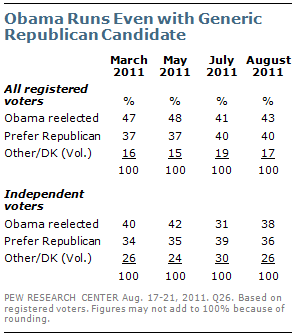
Barack Obama continues to run even with a generic Republican candidate in the 2012 general election. Among registered voters, 43% say they would like to see Obama reelected while 40% say they would prefer that a Republican candidate win the election. Voter preferences are little changed from July, but Obama has lost the advantage he held over a Republican candidate in the spring of this year.
Independent voters are divided over their preference in the 2012 general election. As many say they would like to see Obama reelected (38%) as say they prefer a Republican candidate to win (36%). In May, Obama enjoyed a seven-point edge among independents (42%-35%). In July, just 31% of independents backed Obama while 39% preferred to see a Republican win.
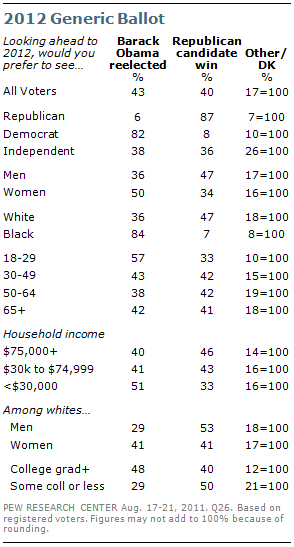
About eight-in-ten Democrats (82%) say they want Obama to be reelected; liberal Democrats (91%) are more likely to take this view than are conservative and moderate Democrats (76%). By comparison, 87% of Republicans say they prefer a GOP candidate to win, including 91% of conservative Republicans.
Obama continues to perform well among young people, blacks and low-income households. Women also support Obama over a generic Republican by a 50%-34% margin.
Among whites, Obama trails a Republican candidate 47%-36% and he performs particularly poorly among white men (53%-29% GOP candidate) and whites without a college degree (50%-29% GOP candidate).
Voters View the GOP Field
In evaluating possible Republican candidates, most voters (54%) say there is at least some chance they would vote for Mitt Romney, among those who have heard of the former Massachusetts governor. Recent entry Rick Perry also ranks comparatively well among the GOP field. While Perry is not as well known as Romney, 47% of those who have heard of Perry say there is at least some chance they would vote for him.
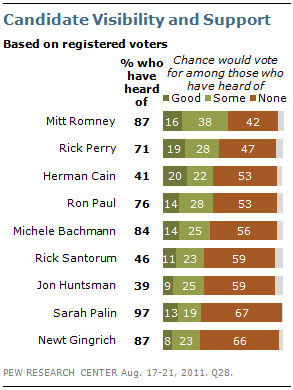
Other highly visible Republicans garner less potential support from voters. In particular, roughly two-thirds of those familiar with Sarah Palin and Newt Gingrich say there is no chance they would vote them. Somewhat smaller majorities say there is no chance they would vote for Michele Bachmann (56%) or Ron Paul (53%). Herman Cain, Rick Santorum and Jon Huntsman are still unfamiliar to a majority of voters, and receive limited support even from those who have heard of them.
Michele Bachmann has become much more visible in recent months. However, she garners no greater potential support from voters who have heard of her now than three months ago. In May, slightly more than half of voters (54%) had heard of Michele Bachmann. In the current survey, that number has risen to 84%. Yet of those who have heard of her, the share who would consider voting for her has remained unchanged: 40% in May, compared with 39% in the current survey.
Republican Views of GOP Candidates
Republican and Republican-leaning voters offer a positive initial response to Rick Perry’s candidacy. Eight-in-ten (80%) have heard of Perry and about three-quarters (77%) of those who have heard of him say there is a least some chance they would vote for him. Mitt Romney is somewhat better known than Perry (94% have heard of him) and receives similar potential
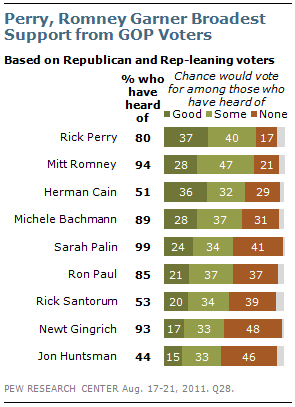
support with 75% of those who have heard of him saying there is at least some chance they would vote for him.
While overall support for Romney and Perry is similar, slightly more say there is a good chance they would vote for Perry (37%) than say the same for Romney (28%).
Herman Cain is known by 51% of Republican voters, placing him among the least visible GOP candidates. However, he receives strong support from those who have heard of him – 68% say there is at least some chance they would vote for him, including 36% who say there is a good chance.
Nearly all Republican and Republican-leaning voters have heard of Sarah Palin (99%) and more than eight-in-ten recognize Michele Bachmann (89%) and Ron Paul (85%). However, these highly visible potential candidates receive somewhat less support than Perry and Romney. About two-thirds (65%) of GOP voters who have heard of Bachmann say there is at least some chance they would vote for her, while 31% say there is no chance they would back her. Smaller majorities (58% each) of Republican voters say there is some chance they would vote for Palin and Paul.
Newt Gingrich is known by 93% of Republican and Republican-leaning voters. About as many say there is no chance they would vote for Gingrich (48%) as say there is at least some chance (50%). Jon Huntsman is the least visible major candidate (just 44% of Republican and Republican-leaning voters have heard of him), and also draws only modest support from those familiar with him.
Tea Party Republicans’ Views of GOP Field
While Rick Perry and Mitt Romney have similar levels of support among GOP voters overall, Perry receives particularly strong support among those who agree with the Tea Party.
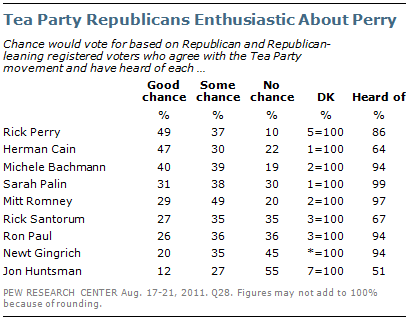
More than eight-in-ten Tea Party Republicans who have heard of Rick Perry say there is at least some chance they would vote for him (86%), including 49% who say there is a good chance. Mitt Romney also receives strong potential support (78% of Tea Party Republicans say there is some chance they would vote for him) but far fewer Tea Party Republicans say there is a good chance they would vote for Romney (29%). Since May, the percentage of Tea Party Republicans who say there is a good chance they would vote for Romney has slipped nine points.
Michele Bachmann is one of several GOP candidates who fare better among Tea Party Republicans than among Republicans who disagree with or have no opinion of the Tea Party. About eight-in-ten Tea Party Republicans (79%) say there is at least some chance they would vote for her, 40% say there is a good chance. By comparison, 49% of non-Tea Party Republicans say there is at least some chance they would vote for her, just 15% say there is a good chance.
About seven-in-ten Tea Party Republicans (69%) say there is at least some chance they would vote for Sarah Palin, including 31% who say there is a good chance.
Herman Cain remains less well-known among Tea Party Republicans than most other candidates (64% have heard of him), but those who can rate him offer strong potential support. About three-quarters say there is at least some chance they would vote for him (77%), including 47% who say good chance.
Bachmann and Perry Most Visible Candidates
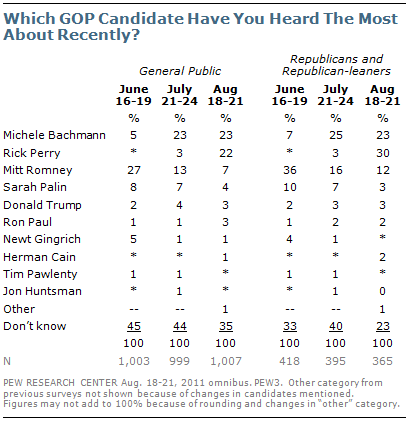
Following his entry into the Republican presidential contest, Perry joined Bachmann as the most visible candidates in the race. When asked what possible candidate they’ve heard the most about in the news recently, 23% say Bachmann and 22% name Perry. Far fewer (7%) name Romney. None of the other candidates is mentioned by more than 4% of the public.
One month ago – before Perry joined the race –Bachmann was the most visible GOP candidate. In a July 21-24 poll, about a quarter (23%) mentioned Bachmann, 13% named Romney and 3% offered Perry.
Currently, Perry and Bachmann also are about equally visible among Republicans and Republican-leaning independents. Three-in-ten (30%) say Perry is the candidate they have been hearing most about, while 23% who say that candidate is Bachmann. Another 12% name Romney.
But Perry is far and away the most visible candidate among Republicans and GOP-leaning independents who say they are following campaign news very closely. More than half of this group (53%) say they have been hearing the most about Perry; 21% say they have been hearing most about Bachmann and 12% say Romney. Among those following less closely, 25% say they have been hearing the most about Bachmann, 18% say Perry and 13% say Romney.
Following Bachmann’s victory in the Iowa straw poll and the entrance of Perry into the race on August 13, interest in the campaign has grown. In the most recent News Interest Index survey, about one-in-four (27%) report following news about the campaign very closely. That is a high point for the year.
Who Can Beat Obama?
When asked which GOP candidate has the best chance of defeating Obama, more voters name Mitt Romney than any other candidate. But Rick Perry is seen as having the best chance to
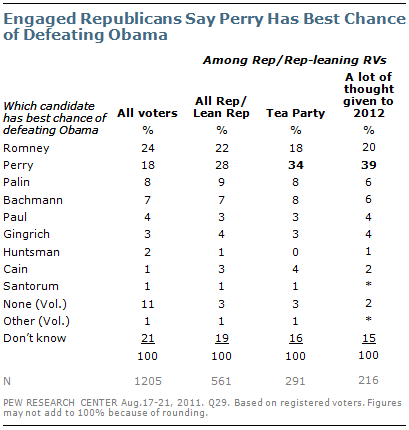
win by Republican voters who agree with the Tea Party and by Republicans who have given a lot of thought to 2012.
Overall, 24% of voters say Mitt Romney is the potential GOP candidate with the best chance of defeating Barack Obama. Rick Perry (18%) is the second most mentioned candidate. No other GOP candidate is mentioned by more than 8% of voters.
Perry is seen as having the best chance to defeat Obama by Republican voters who agree with the Tea Party movement and by Republican voters who have given a lot of thought to the candidates running in 2012. About a third (34%) of Tea Party Republicans say Perry has the best chance of winning next year’s election, significantly fewer (18%) say Romney. Similarly, 39% of Republican and Republican-leaning voters who have given a lot of thought to 2012 say Perry has the best chance of defeating Obama, 20% say Romney has the best chance.
Voter Engagement Edges Higher
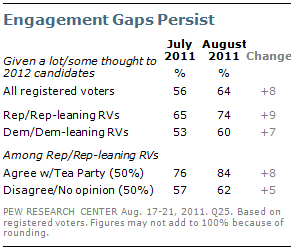
About two-thirds of voters (64%) have given at least some thought to the candidates who may be running for president in 2012, including 32% who say they have given 2012 “a lot” of thought. Overall, thought given is up eight points from July and the change has come entirely from those who say they have given the 2012 candidates “a lot” of thought (24% in July, 32% in the current survey).
Republican and Republican-leaning voters continue to express somewhat more interest in the 2012 candidates than do their Democratic counterparts. Nearly seven-in-ten Republican voters (74%) have given at least some thought to 2012 compared with 60% of Democratic voters.
Tea Party Republicans are especially engaged: 84% of Republican voters who agree with the Tea Party movement have given at least some thought to the candidates running in 2012, compared with 62% of Republican voters who do not agree with the movement.
Ratings of Overall GOP Field
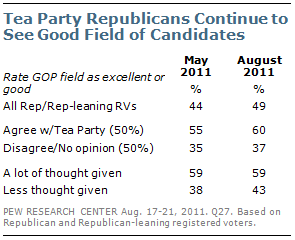
At this early stage of the nomination process, Republican voters continue to offer tepid ratings of the overall GOP field. No more than half (49%) call the group of candidates running for the GOP nomination excellent (9%) or good (40%), nearly as many (44%) say they are only fair (38%) or poor (6%) candidates.
Tea Party Republican voters remain more favorable toward the GOP field than do non-Tea Party Republicans. Six-in-ten Tea Party Republicans (60%) call the GOP candidates excellent or good, compared with 37% of those who do not agree with the Tea Party. Republican voters who have given a lot of thought to the candidates running in 2012 also express favorable views of the field: 59% call the GOP candidates excellent or good, compared with 43% of Republicans who have given less thought to the election.